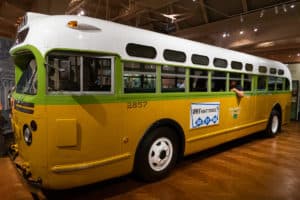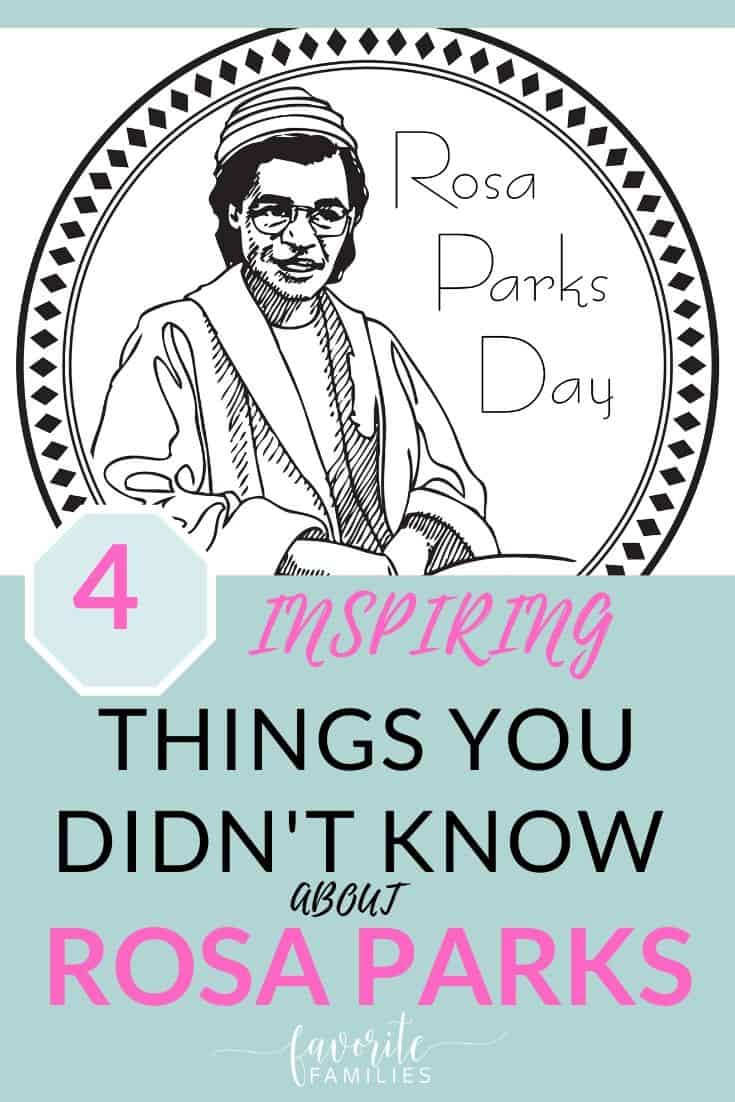Rosa Parks is one of my personal heroes.
Back when I first learned about her, she was “that little old lady who refused to give up her seat on the bus” and happened to make a major impact on history. I’m not sure where I heard this rendition of her story, but maybe this is how you think of her as well.
But last year, I was intrigued by this inspiring woman and decided to dig deeper into her life. And what I learned blew me away.
Here are 4 things you probably didn’t know about Rosa Parks:
This post contains affiliate links. That means I get a small commission from qualifying purchases at no additional cost to you. I only recommend things I use and love or would purchase myself! Read my full disclosure here.
1. She wasn’t old.
Lots of times when we see photos of Rosa Parks, they are from later in her life, when she WAS an older woman. But did you know she was only 42 years old on that historical day on the bus? She was only a few years older than I am now when she helped change the course of history.
2. She was strategic.
Many people assume that Rosa just happened to be in the right place at the right time and had no idea the impact of what she was doing.
This couldn’t be farther from the truth.
Did you know that Ms. Parks was an active member and chapter secretary of the Montgomery NAACP (National Association for the Advancement of Colored People) for 12 YEARS prior to her famous stand? She was an intentional advocate for civil rights and worked to prevent unjust treatment of black people, especially men, such as lynchings and false sexual assault convictions. Not an easy thing by any stretch of the imagination. Did I mention her grandparents were slaves? Like many others, Rosa attended segregated schools.
In 1954, the court decision of Brown vs. the Board of Education declared “separate cannot be equal.” As you probably know, this key court case led to the integration of schools.
But there was a lot more work to be done to move towards de-segregation in every area of society. Rosa’s bold move led to the Montgomery Bus Boycott, where 40,000 people refused to board the city buses, many of whom lost or risked losing their jobs because of it. This boycott then led to a nationwide bus boycott that brought about the end of segregated public transportation in America.
3. Rosa wasn’t sitting in the “white” section of the bus.
Actually, she was sitting in the first row of the approved “colored” section of the bus on this ride. But, as the bus picked up more passengers, all the “white” seats got filled up and a white man had nowhere in his section to sit. The driver of the bus, James F. Blake, told Rosa and the other 3 people sitting in that first row of the colored section to move, so this white man could have that entire row.
Despite Rosa’s urgings to the others seated next to her, all 3 of them got up and moved farther back. But not Rosa. She stayed put.
The driver got up from his seat and walked boldly to where Rosa was seated and demanded, “Are you going to stand up?”
This was not Rosa’s first encounter with James F. Blake. On the contrary, 12 years prior to this famous incident, she had encountered Blake on another bus ride, in which he told her, despite the pack of people blocking her way, to exit the crowded bus and get on from the back. Instead of making a scene or risking an altercation, she chose to disembark altogether.
Fast forward 12 years to Blake towering over her demanding once again that she obey his command.
Rosa looked him in the eyes this time and declared with courage, “No.”
She was not old. She was not tired. Instead, she recognized that this was a key moment. And that she was the right person to take a stand.
One of my favorite quotes from her is this, “People always say that I didn’t give up my seat because I was tired, but that isn’t true. I was not tired physically, or no more tired than I usually was at the end of a working day. No, the only tired I was, was tired of giving in.”
4. Rosa had no children, but she was a mother.
Rosa and her husband, Raymond, never had children. But in my eyes, Rosa was very much a mother. She birthed a movement that changed the course of history. And she didn’t do it with herself in mind. She willingly risked her own freedom and stared fear in the face that cold, December 1st evening of 1955 so that future generations could taste true equality. That is the love of a mother.
Rosa was escorted off that bus by two police offers and taken into custody. She was arrested. She lost her job. And the harassment got so bad that she and her husband eventually moved to Detroit.
She outlived her husband by almost 30 years and eventually was awarded the Congressional Gold Medal.
Her life was anything but easy. And we are still working to see the full fruit of that day on the bus come to fruition. But we would not be where we are today without Rosa Parks, Martin Luther King, Jr., Ruby Bridges, and so many others who have risked everything for a vision bigger than just themselves.
For Such a Time as This
Rosa was an Esther in her generation. She was born for such a time as this. Sometimes we forget that Esther and Rosa were not simply in the right place at the right time.
First of all, they caught a vision to bring freedom to a group of people who were being unjustly treated.
Second, they prepared themselves to do whatever it may take to advocate for freedom. They observed. They planned. They got ready. They made hard choices.
Third, when the right moment came, they were ready and willing to lay down everything for the cause they were championing.
Taking a Stand
Wherever you are on your own journey, let me tell you something. Your life is not limited to the off-chance that you might someday end up in the right place at the right time. Your life is bigger than that.
You are not too old, or too young.
You are not the wrong race or gender.
It doesn’t matter if you’re single or married, have children or don’t.
You were born for such a time as this.
If there is a passion or a cause rising up within you, don’t wait to see what happens. Don’t chance that you’ll end up where you need to be to make a change someday.
Grab hold of the vision to set people free. Start somewhere. Observe, plan, and get ready. Be an advocate RIGHT NOW. And when opportune moments do come, you’ll be ready to jump in with both feet.
Today is the day to start taking your stand.
Read more about this amazing woman in her autobiography, Rosa Parks: My Story or here.
Like this post? You may also enjoy…
- Rough Times? How to Rock Your Season
- 7 Compelling Reasons Moms Should Dream
- Best Year + Best You 5-Day Challenge


